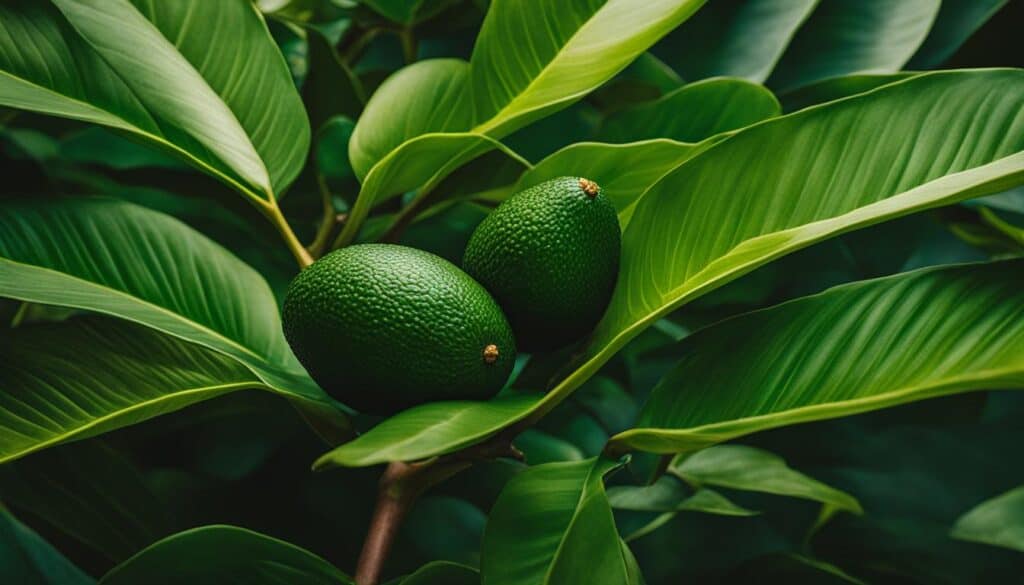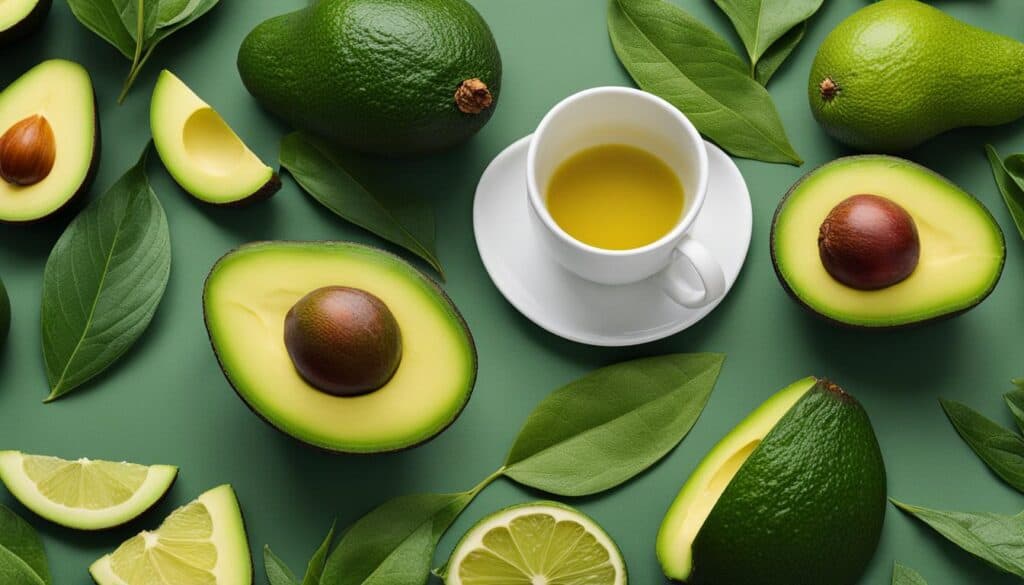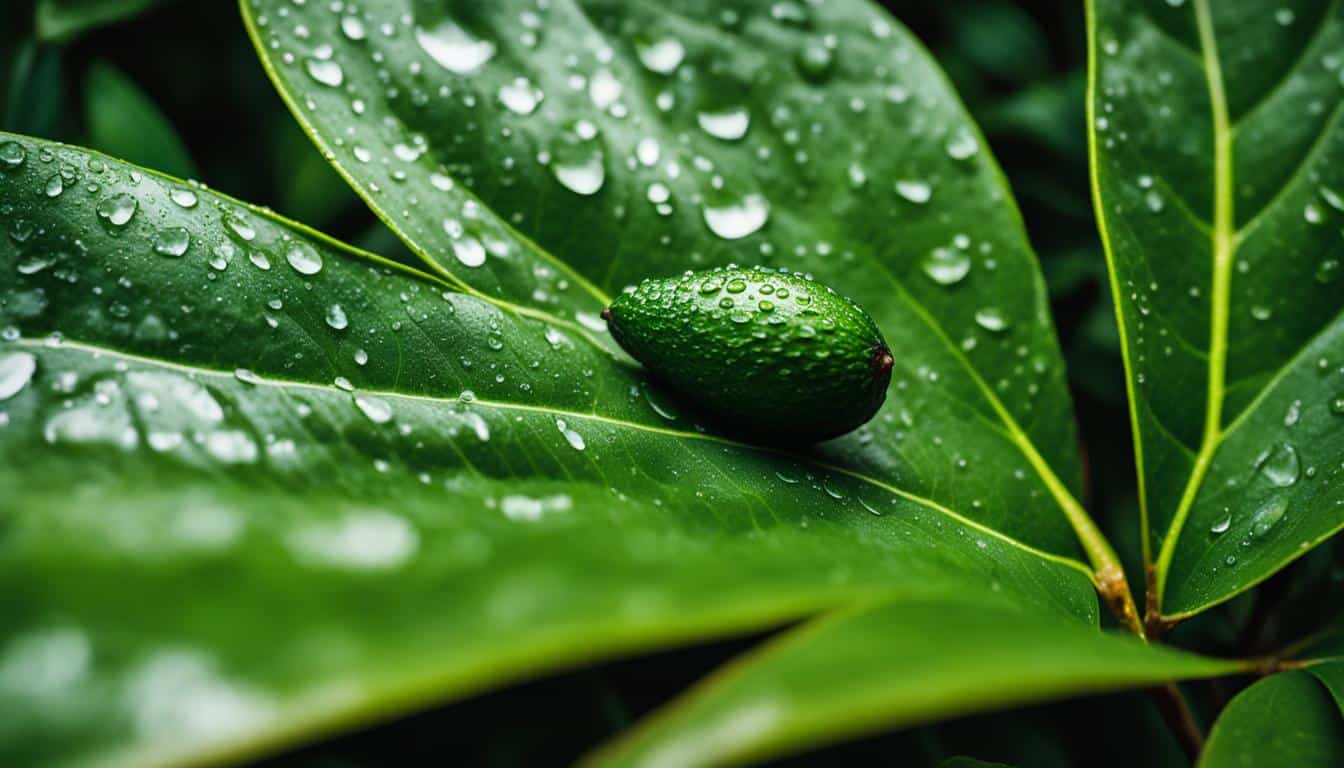Avocado leaves may be the unsung heroes of the avocado tree, often overshadowed by the delicious fruit they bear. However, these leaves possess a treasure trove of health-boosting compounds that have been utilized for centuries in various cultures for their potential medicinal properties. From diabetes management and weight loss to maintaining kidney health and even potential cancer treatment, avocado leaves offer an array of surprising benefits.
Key Takeaways:
- Avocado leaves are a nutritional powerhouse, packed with health-boosting compounds.
- They have been used in various cultures for their potential medicinal properties.
- Avocado leaves can aid in diabetes management, weight loss, and promote kidney health.
- They may have potential in cancer treatment.
- Avocado leaves have versatile uses in personal care and culinary enhancements.
The Many Uses of Avocado Leaves
Avocado leaves are not only packed with health benefits but also have a wide range of versatile uses. From traditional medicine to modern remedies, personal care, and culinary enhancements, avocado leaves have found their way into various aspects of our daily lives.
One popular use of avocado leaves is brewing them into a herbal tea. Avocado leaf tea is known for its soothing properties and is often used to alleviate symptoms of cough and diarrhea. Additionally, it is believed to have potential benefits for diabetes management, making it a natural supplement for those looking to regulate their blood sugar levels.
In the realm of personal care, avocado leaves can be incorporated into hair care products to promote healthy hair and scalp. They are known to stimulate hair growth, reduce hair loss, and even treat scalp conditions like dandruff. Using avocado leaf-infused hair rinses or masks can provide nourishment and enhance the overall health of your hair.
Avocado leaves also find their place in the culinary world. They can add a unique flavor to dishes when used fresh or dried. Mexican cuisine often incorporates avocado leaves for their anise-like scent and taste, while Hass avocado leaves are known for their robust aroma, enhancing the flavor profile of various recipes.
From promoting wellness to enhancing beauty and flavor, avocado leaves offer a multitude of uses worth exploring. Whether you’re sipping on a comforting cup of avocado leaf tea, treating your hair to some avocado leaf-infused TLC, or adding a hint of flavor to your favorite dish, avocado leaves can be a valuable addition to your lifestyle.
Avocado Leaves for Health
Avocado leaves offer a plethora of health benefits that can contribute to overall well-being. These benefits are attributed to the rich compounds and antioxidants found in avocado leaves. Some of the key health benefits of avocado leaves include:
- Regulating blood sugar levels: Avocado leaves have been found to have hypoglycemic properties, which can help in maintaining stable blood sugar levels. This makes them a potentially beneficial addition to the diet of individuals with diabetes.
- Aiding in weight loss: The presence of bioactive compounds in avocado leaves may help support weight loss efforts. These compounds can enhance the body’s metabolism and promote the breakdown of fats.
- Alleviating cough and diarrhea: Avocado leaf tea has long been used in traditional medicine to alleviate symptoms of cough and diarrhea. It is believed to have soothing properties that can help reduce inflammation and provide relief.
- Supporting kidney health: Avocado leaves have diuretic properties, which means they can help increase urine production and promote the elimination of toxins from the body. This can potentially support kidney health and prevent certain kidney-related disorders.
- Potential cancer treatment: Preliminary studies have suggested that avocado leaves may contain compounds with anticancer properties. However, further research is needed to fully understand their potential role in cancer treatment.
With their numerous health benefits, avocado leaves can be incorporated into a balanced and nutritious diet to promote overall health and well-being.
| Health Benefit | Description |
|---|---|
| Regulating blood sugar levels | Avocado leaves have hypoglycemic properties that help stabilize blood sugar levels. |
| Aiding in weight loss | The bioactive compounds in avocado leaves can enhance metabolism and promote fat breakdown. |
| Alleviating cough and diarrhea | Avocado leaf tea has soothing properties that can reduce inflammation and relieve symptoms of cough and diarrhea. |
| Supporting kidney health | The diuretic properties of avocado leaves promote urine production and help eliminate toxins from the body, supporting kidney health. |
| Potential cancer treatment | Preliminary studies suggest that avocado leaves may contain compounds with anticancer properties, although more research is needed. |
It’s important to note that while avocado leaves offer potential health benefits, it is always advisable to consult with a healthcare professional before incorporating them into your diet or treatment plan.
Avocado Leaves for Personal Care
Avocado leaves not only offer a multitude of health benefits but also provide several advantages for personal care, especially when it comes to hair care. These leaves can be used in various ways to promote hair growth, reduce hair loss, and treat common scalp conditions like dandruff.
One effective method of harnessing the benefits of avocado leaves for hair care is by creating a homemade hair rinse. To make this rinse, simply boil a handful of avocado leaves in water, let it cool, and strain the liquid. Use this herbal infusion as a final rinse after shampooing to add shine, nourish the scalp, and strengthen the hair follicles.
In addition to hair rinses, avocado leaves can also be used to make hair masks. Mix avocado leaf powder with natural ingredients like yogurt or coconut oil to create a nourishing and revitalizing hair mask. Apply the mask to your hair, leave it on for 20-30 minutes, and then rinse thoroughly to restore moisture, repair damage, and promote overall hair health.
| Benefits of Avocado Leaves for Hair Care |
|---|
| Promotes hair growth |
| Reduces hair loss |
| Treats scalp conditions like dandruff |
Whether in the form of a hair rinse or a hair mask, avocado leaves can be a natural and effective addition to your hair care routine. Their nourishing properties and ability to address common hair concerns make them a valuable ingredient for maintaining healthy and vibrant hair.
Understanding Avocado Varieties and Their Leaves

Avocado trees come in different varieties, each with its own unique characteristics and uses for their leaves. The three most popular avocado varieties are Hass, red, and Mexican avocados. Let’s take a closer look at each variety and explore their distinct qualities.
Hass Avocado Leaves
The leaves of the Hass avocado tree are widely consumed and known for their robust aroma. They can add a delightful flavor to dishes, making them a popular choice in culinary applications. In addition to their culinary appeal, Hass avocado leaves also offer a range of health benefits similar to other avocado varieties.
Red Avocado Leaves
The leaves of red avocado trees add a vibrant splash of color to any garden or landscape. While they may differ in appearance, the health benefits of red avocado leaves are similar to those of other avocado varieties. These leaves can be harvested and utilized in the same way as leaves from green-skinned avocados.
Mexican Avocado Leaves
Mexican avocado leaves have a unique anise-like scent, making them a popular choice in Mexican cuisine. They are commonly used in dishes such as tamales and mole sauce to enhance flavor. Like other avocado leaves, Mexican avocado leaves also offer numerous health benefits thanks to their nutrient-rich composition.
| Avocado Variety | Characteristics | Uses |
|---|---|---|
| Hass | Robust aroma, widely consumed | Culinary applications, flavoring dishes |
| Red | Vibrant color, similar health benefits | Landscaping, culinary applications |
| Mexican | Anise-like scent, popular in Mexican cuisine | Flavoring Mexican dishes |
Whether you’re looking to enhance the flavor of your meals, add a pop of color to your garden, or enjoy the numerous health benefits, avocado leaves from different varieties offer a range of possibilities. Consider experimenting with the leaves of Hass, red, and Mexican avocados in your culinary creations or explore their uses in traditional medicine and personal care.
Youthful Avocado Leaves versus Fresh Avocado Leaves: Understanding the Differences
Avocado leaves go through distinct growth stages, each with its own unique characteristics. Young avocado leaves, also known as immature leaves, emerge with a beautiful reddish or purplish hue that gradually transitions to a vibrant green as they mature. This color transformation signifies that the leaves are ready to take on the essential task of efficient photosynthesis, aiding in the tree’s overall growth and development.
The young avocado leaves possess a delicate texture and tenderness, while their mature counterparts have a more robust and sturdy structure. However, it is important to note that both young and fresh avocado leaves contain the same beneficial compounds and antioxidants, which contribute to the leaves’ numerous health benefits.
Young avocado leaves, with their striking color and tender texture, bring a touch of beauty and delicacy to any avocado tree. As they mature, they acquire strength and resilience, ensuring the tree’s longevity and vitality.
The Versatility of Young Avocado Leaves
While both young and fresh avocado leaves offer similar health benefits, young avocado leaves are often preferred by culinary enthusiasts for their unique taste and aesthetic appeal. Their vibrant color adds a visually enticing element to dishes, making them a popular choice for garnishing and enhancing the overall presentation. Moreover, their tender texture allows for easy incorporation into various recipes, ensuring a refreshing and delightful culinary experience.
In addition to their culinary applications, young avocado leaves are also used in traditional medicine for their potential therapeutic properties. They can be brewed into a tea, which is believed to help alleviate digestive issues and promote overall well-being.
| Young Avocado Leaves | Fresh Avocado Leaves |
|---|---|
| Beautiful reddish or purplish hue | Vibrant green color |
| Tender texture | Robust and sturdy structure |
| Used for culinary enhancements and garnishing | Preferred for traditional medicine and personal care |
Reading Avocado Leaves: A Comprehensive Guide

When it comes to the health of an avocado tree, reading the leaves can provide valuable insights into its overall well-being. Avocado leaves can exhibit various symptoms and signs that indicate potential issues, allowing us to take proactive measures to maintain the tree’s health. Here are some common avocado leaf symptoms and signs to look out for:
Avocado Leaves Symptoms:
- Yellowing leaves: Yellowing or pale green leaves may indicate a nutrient deficiency, such as a lack of nitrogen, iron, or magnesium. Adjusting the fertilizer or soil composition can help address this problem.
- Wilting leaves: Wilting or drooping leaves can signify inadequate watering or excessive moisture. It’s important to strike a balance and ensure the avocado tree receives proper hydration.
- Spots or discoloration: Spots or discoloration on avocado leaves can suggest various issues, such as fungal infections, nutrient deficiencies, or pests. Identifying the specific cause and taking appropriate action is crucial to save the tree.
Avocado Leaves Signs:
- Curling leaves: Curling or cupping of the leaves can be a sign of stress caused by environmental factors like excessive heat or insufficient watering. Adjusting the growing conditions can help alleviate this issue.
- Holes or chewed edges: Holes or chewed edges in avocado leaves can indicate the presence of pests, such as caterpillars or beetles. Using natural or organic pest control methods can help protect the tree from damage.
- Brittle or dry leaves: Brittle or excessively dry leaves can be a result of inadequate moisture or exposure to extreme temperatures. Ensuring proper irrigation and providing shade during hot weather can help prevent leaf dehydration.
Regularly inspecting avocado leaves for symptoms and signs is essential for maintaining the health of the tree. Taking proactive measures to address any issues can help prevent further damage and ensure the longevity of your avocado tree.
| Symptoms | Causes | Solutions |
|---|---|---|
| Yellowing leaves | Nutrient deficiency (nitrogen, iron, magnesium) | Adjust fertilizer or soil composition |
| Wilting leaves | Inadequate watering or excessive moisture | Ensure proper hydration |
| Spots or discoloration | Fungal infections, nutrient deficiencies, pests | Identify cause and take appropriate action |
| Curling leaves | Environmental stress (heat, watering) | Adjust growing conditions |
| Holes or chewed edges | Pest infestation (caterpillars, beetles) | Use natural or organic pest control methods |
| Brittle or dry leaves | Inadequate moisture, extreme temperatures | Ensure proper irrigation and provide shade |
Keep in mind that avocado leaf symptoms and signs can vary depending on the specific issue, environmental factors, and tree health. It’s always beneficial to consult with a professional arborist or horticulturist for a comprehensive assessment and guidance on addressing any avocado leaf-related concerns.
How to Use Avocado Leaves
Avocado leaves offer a multitude of possibilities when it comes to incorporating them into your daily routine. Whether you are looking to enjoy the health benefits or add a unique flavor to your culinary creations, avocado leaves can be used in various ways.
Boiling Avocado Leaves
One popular method of using avocado leaves is by boiling them to create a herbal tea. Simply gather a handful of fresh leaves, rinse them thoroughly, and add them to a pot of boiling water. Allow the leaves to simmer for about 10 minutes, then strain the liquid. You can enjoy the avocado leaf tea as is or add a touch of honey for sweetness.
Avocado Leaf Powder
If you prefer a more convenient option, avocado leaf powder can be a great addition to your pantry. To make avocado leaf powder, gather a bunch of fresh leaves and dry them thoroughly. Once dried, grind the leaves into a fine powder using a spice grinder or mortar and pestle. The resulting powder can be used as a seasoning in various dishes or added to smoothies for an extra nutritional boost.
When cooking with avocado leaves, keep in mind that they have a subtle anise-like flavor. They pair well with dishes like soups, stews, and sauces, adding a unique depth of flavor. Remember to remove the leaves before serving the final dish, as they can be tough and fibrous.
Whether you choose to brew avocado leaf tea, create your own avocado leaf powder, or infuse their flavor into your cooking, avocado leaves are a versatile ingredient that can enhance both your health and culinary experiences.
Conclusion

After exploring the surprising benefits and versatile uses of avocado leaves, it is clear that they are a valuable addition to a well-rounded lifestyle. From health management to personal care and culinary enhancements, avocado leaves offer a range of advantages that can positively impact our well-being.
Avocado leaves have been found to aid in diabetes management, promote weight loss, and support kidney health. They can also be used in personal care routines to promote hair growth and treat scalp conditions. Additionally, avocado leaves are a flavorful and nutritious addition to various recipes.
By incorporating avocado leaves into our daily lives, whether through herbal teas, powders, or culinary creations, we can harness their rich nutrient content and numerous health benefits. As a natural and versatile resource, avocado leaves provide a unique opportunity to enhance our overall health and well-being.
| Benefits of Avocado Leaves | Uses of Avocado Leaves |
|---|---|
| Diabetes management | Herbal tea |
| Weight loss | Personal care products |
| Kidney health | Culinary enhancements |
| Potential cancer treatment |
As we continue to discover new benefits and uses for avocado leaves, it is clear that they hold great potential for improving our health and well-being. Whether in the form of a comforting tea, a nourishing hair mask, or a flavorful addition to our favorite dishes, avocado leaves offer a natural and holistic approach to enhancing our lives.
Additional Benefits of Avocado Leaves: Hypertension Management
Avocado leaves offer more than just their well-known health benefits. Research has shown that these remarkable leaves can also help in managing hypertension, particularly in the elderly. Consuming avocado leaf extract has been found to have a significant impact on reducing blood pressure levels, providing a natural and holistic approach to hypertension management.
Studies have revealed that avocado leaves contain compounds that effectively lower systolic and diastolic blood pressure in elderly individuals. These compounds work by increasing the excretion of salt and water from the body, reducing the risk of heart diseases and complications associated with hypertension. The anti-inflammatory properties of avocado leaves also contribute to their effectiveness in regulating blood pressure levels.
By incorporating avocado leaves into their diet or consuming avocado leaf tea, individuals can benefit from the hypertension management properties of these leaves. Avocado leaves not only offer a natural alternative to traditional medications but also provide additional nutritional value, as they are rich in antioxidants and other beneficial compounds.
Avocado Leaves and Hypertension Among the Elderly
A study conducted in Indonesia in 2015 investigated the effects of avocado leaf extract on blood pressure levels among elderly individuals. The results revealed that the extract had a significant impact on reducing both systolic and diastolic blood pressure. This finding suggests that avocado leaves may offer a natural and effective approach to managing hypertension in the elderly.
The study found that avocado leaf extract increased the excretion of salt and water in the body, leading to a decrease in blood pressure. This mechanism of action aligns with the well-known diuretic properties of avocado leaves, which have been utilized in traditional medicine for their ability to promote urination and eliminate excess fluid from the body.
Furthermore, the immediate and long-lasting effect of avocado leaves on blood pressure suggests their potential as a complementary therapy for hypertension management. Incorporating avocado leaves into the diet or using avocado leaf extract under the guidance of a healthcare professional may provide an additional tool to support overall cardiovascular health in the elderly population.
While more research is needed to fully understand the optimal dosage and long-term effects of avocado leaves on hypertension management, these preliminary findings provide valuable insights into the potential benefits of this natural remedy. Avocado leaves have a long history of traditional use, and their potential as a non-pharmacological approach to reducing blood pressure levels offers a promising avenue for future exploration.
| Study Title | Effects of Avocado Leaf Extract on Blood Pressure in Elderly Individuals |
|---|---|
| Location | Indonesia |
| Year | 2015 |
| Participants | Elderly individuals with hypertension |
| Method | Avocado leaf extract administration |
| Findings | Avocado leaf extract significantly reduced systolic and diastolic blood pressure levels |
| Conclusion | Avocado leaves may offer a natural and effective approach to managing hypertension among the elderly |
Avocado Leaves: A Natural Approach to Hypertension Management
Managing hypertension is a crucial aspect of maintaining good heart health, especially among elderly individuals. While there are various pharmacological options available, avocado leaves offer a natural approach to hypertension management that can complement traditional treatment strategies.
The effectiveness of avocado leaves in reducing blood pressure levels can be attributed to their rich nutrient content and anti-inflammatory properties. They contain beneficial compounds that help reduce inflammation and increase the oxygen supply to the heart muscle, potentially reducing the risk of heart diseases and complications associated with hypertension.
By incorporating avocado leaves into your daily routine, you can take advantage of their natural properties to support your cardiovascular health. Whether brewed as a herbal tea, used as an ingredient in cooking, or consumed in the form of avocado leaf extract, avocado leaves provide a holistic and non-pharmacological approach to managing hypertension.
Remember, while avocado leaves may offer benefits for hypertension management, it is important to consult with your healthcare provider before making any significant changes to your treatment plan. They can provide personalized guidance and ensure that avocado leaves are a safe and suitable addition to your overall hypertension management strategy.
FAQ
What are the benefits of avocado leaves?
Avocado leaves offer numerous health benefits, including their potential to regulate blood sugar levels, aid in weight loss, alleviate cough and diarrhea, support kidney health, and potentially play a role in cancer treatment.
How can avocado leaves be used?
Avocado leaves have versatile applications, from brewing them into a herbal tea to incorporating them into personal care products or recipes to enhance flavor and nutritional profile.
What are the different uses of avocado leaves?
Avocado leaves can be used for diabetes management, weight loss, personal care, and culinary enhancements.
Can avocado leaves be used for hair care?
Yes, avocado leaves can promote hair growth, reduce hair loss, and treat scalp conditions like dandruff. They can be used in hair rinses, hair masks, or incorporated into hair care products.
What are some popular varieties of avocado leaves?
Hass avocado leaves have a robust aroma and are widely consumed, while red avocado leaves add color and offer the same health benefits. Mexican avocado leaves have an anise-like scent and are commonly used in Mexican cuisine.
How do you differentiate between young and mature avocado leaves?
Young avocado leaves have a reddish or purplish hue, which gradually turns green as they mature, indicating they are ready for efficient photosynthesis.
What do the signs exhibited by avocado leaves indicate?
Yellowing leaves may indicate a nutrient deficiency, while curling leaves could signify inadequate watering. Monitoring the condition of the leaves can provide insights into the overall health of the avocado tree.
How can avocado leaves be used for cooking?
Avocado leaves can be boiled to make herbal tea, turned into avocado leaf powder for culinary purposes, or incorporated into recipes to enhance flavor and nutrition.
What are the additional benefits of avocado leaves?
Avocado leaves have been found to help lower blood pressure levels, particularly in elderly individuals, and potentially reduce the risk of heart diseases and complications related to hypertension.
Can avocado leaves be used for hypertension management?
Yes, avocado leaves offer a natural approach to managing hypertension, particularly among elderly individuals, with their rich nutrient content and anti-inflammatory properties contributing to their effectiveness in reducing blood pressure levels.





Leave a Reply